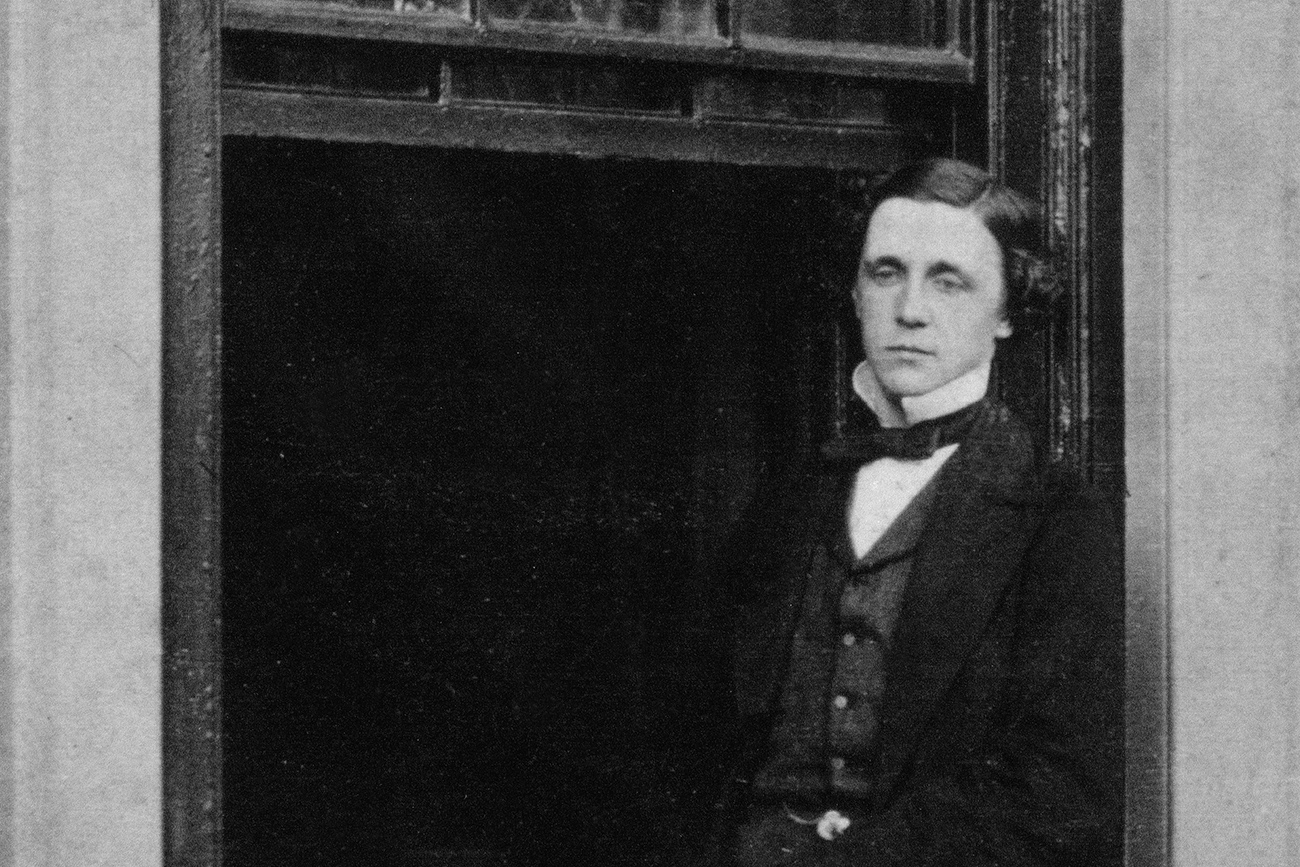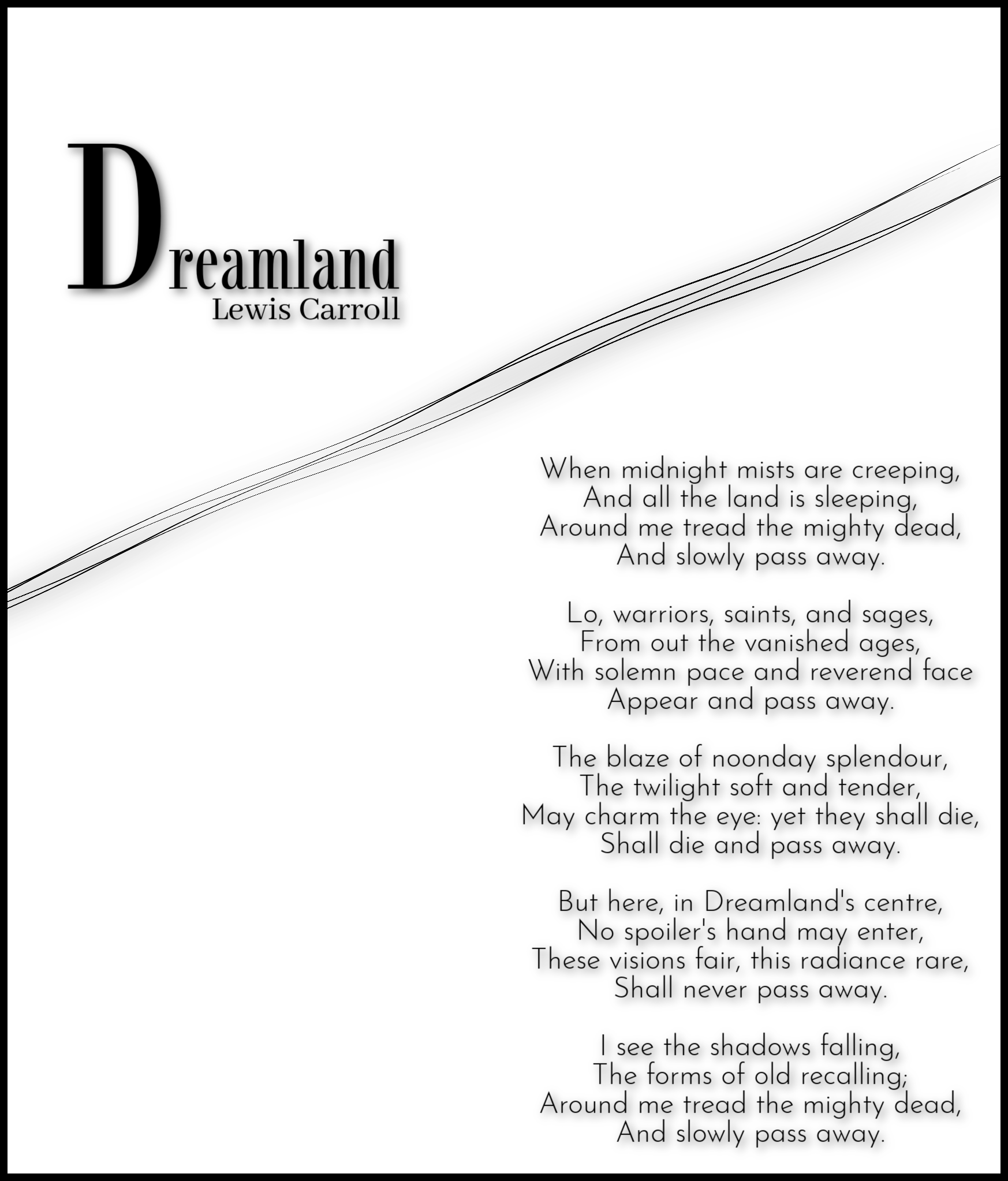
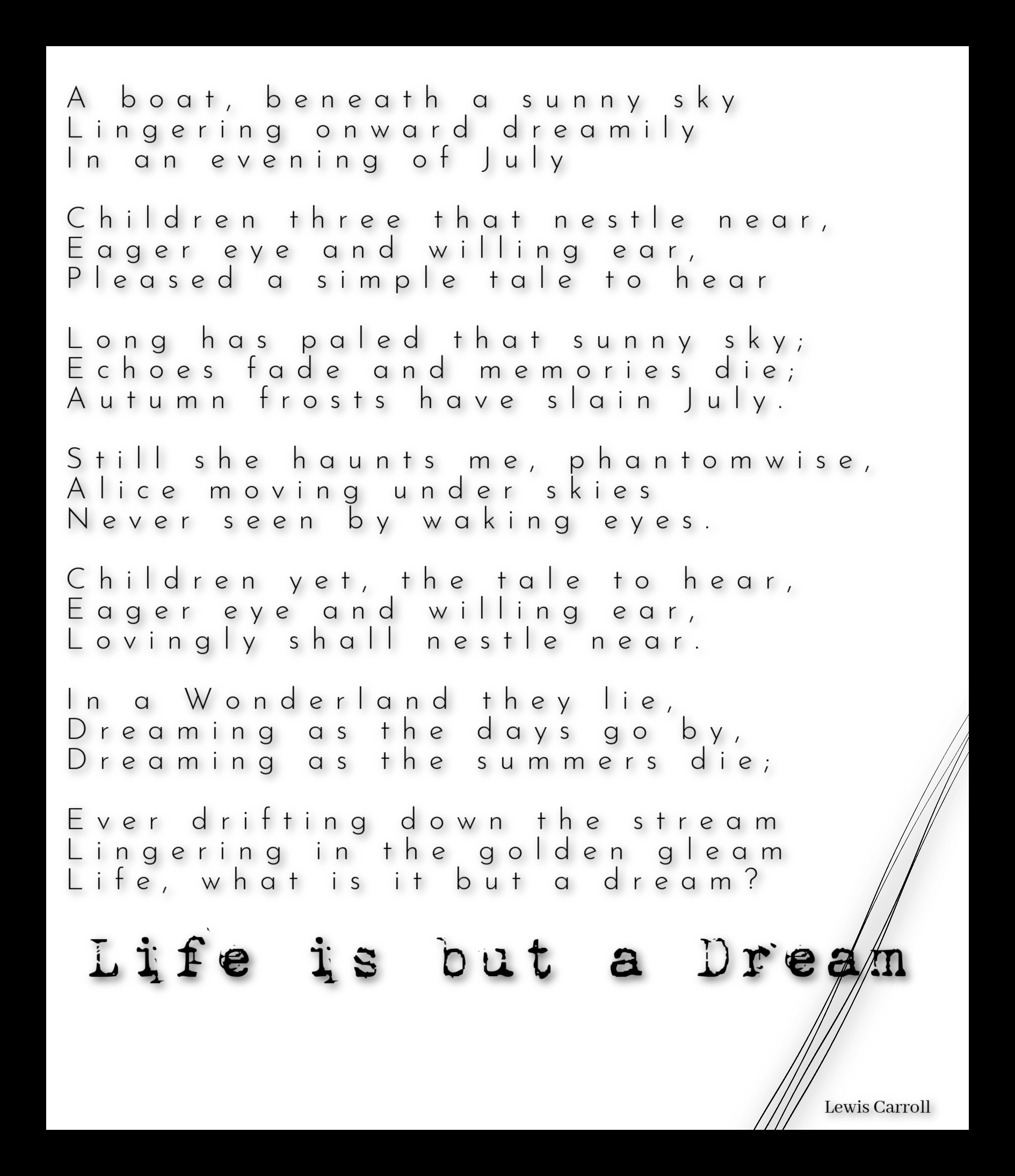
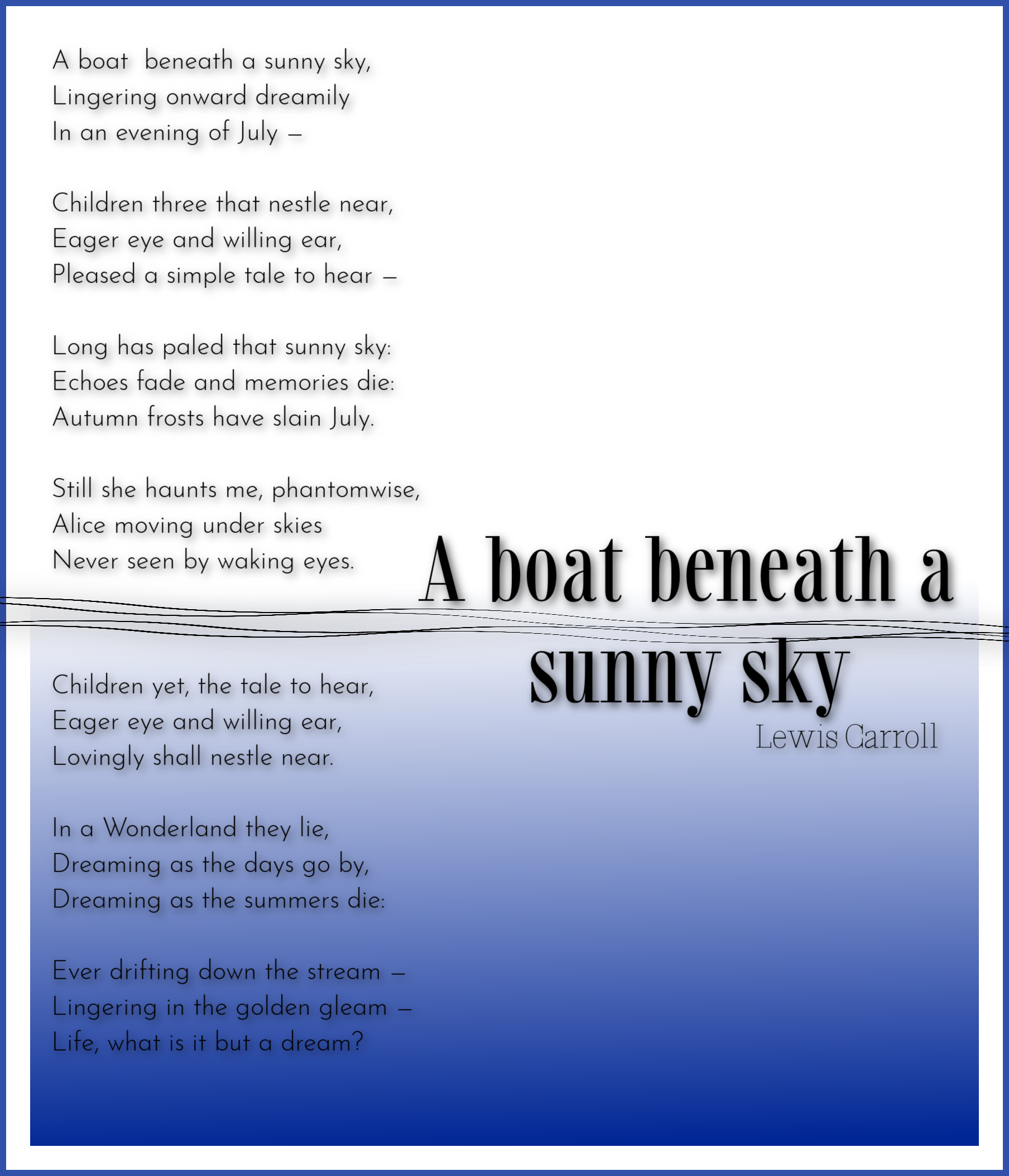
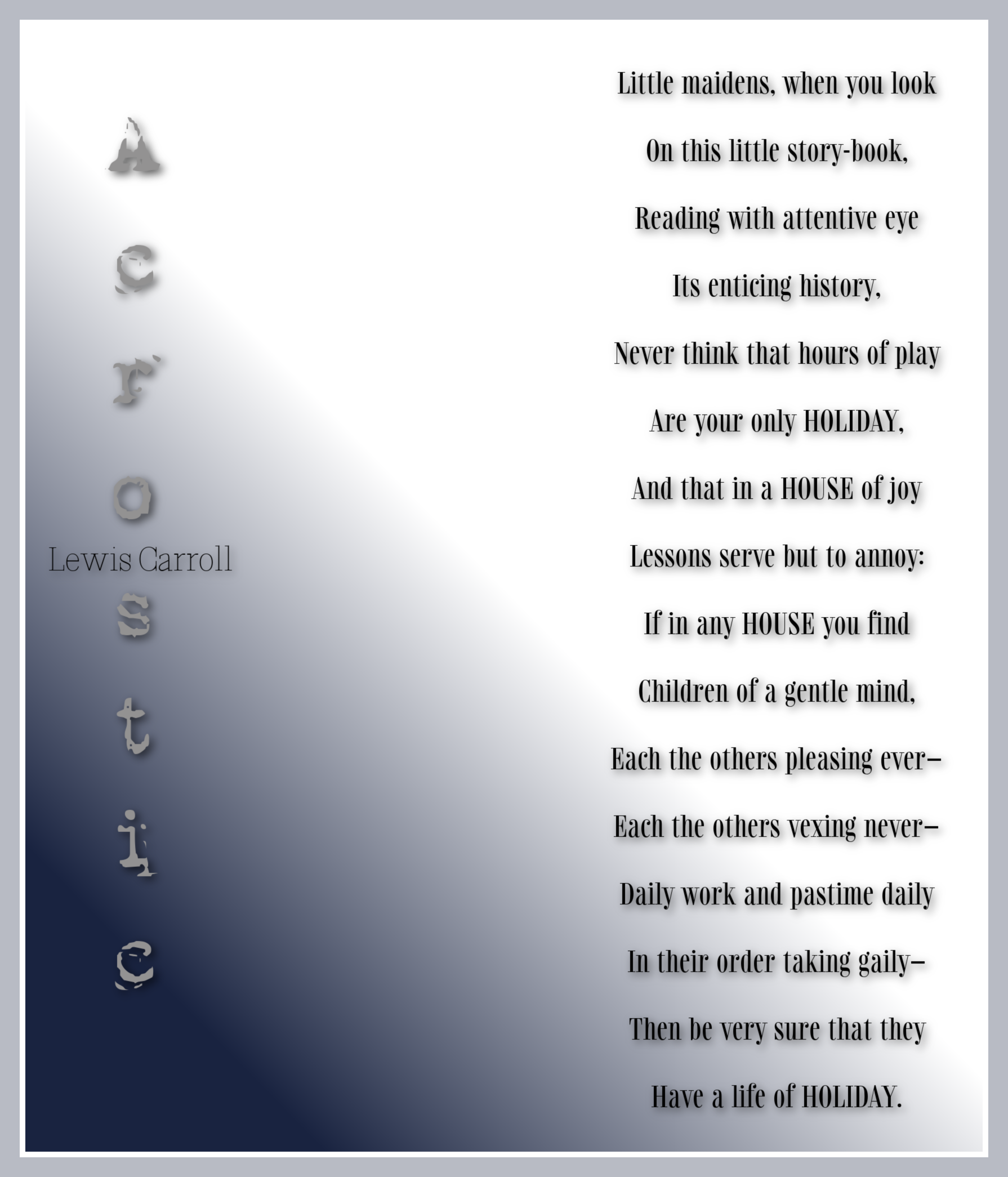
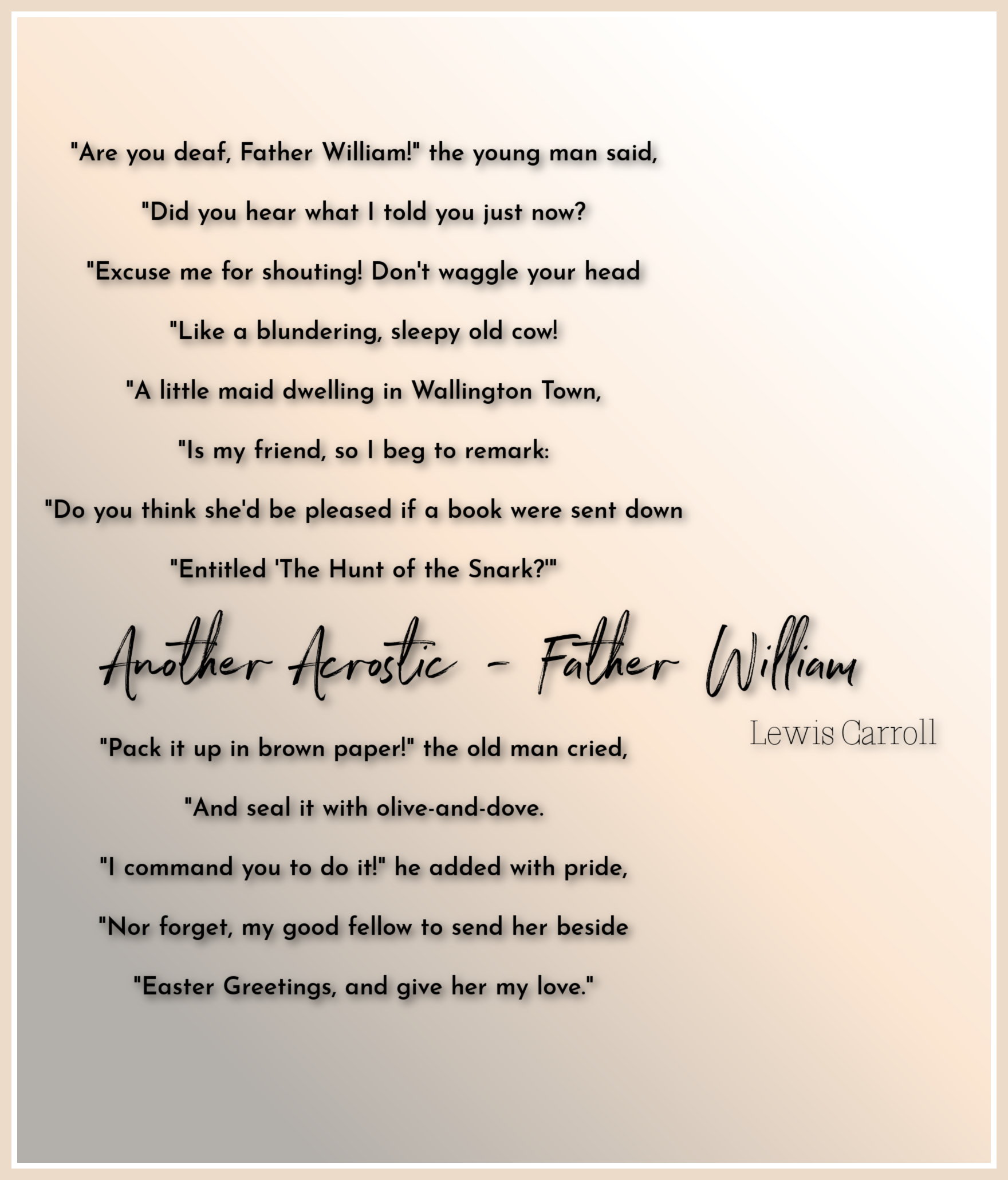
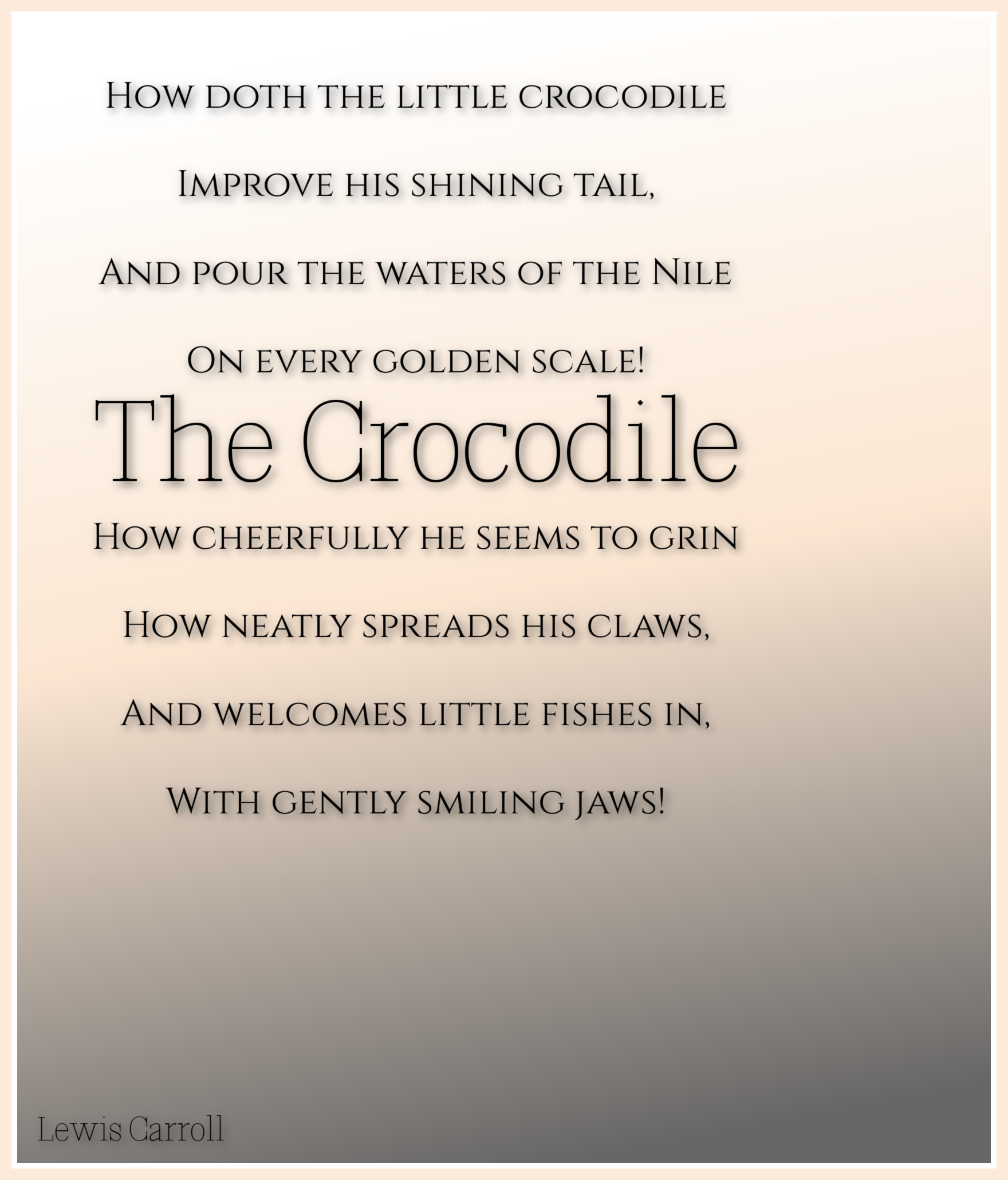
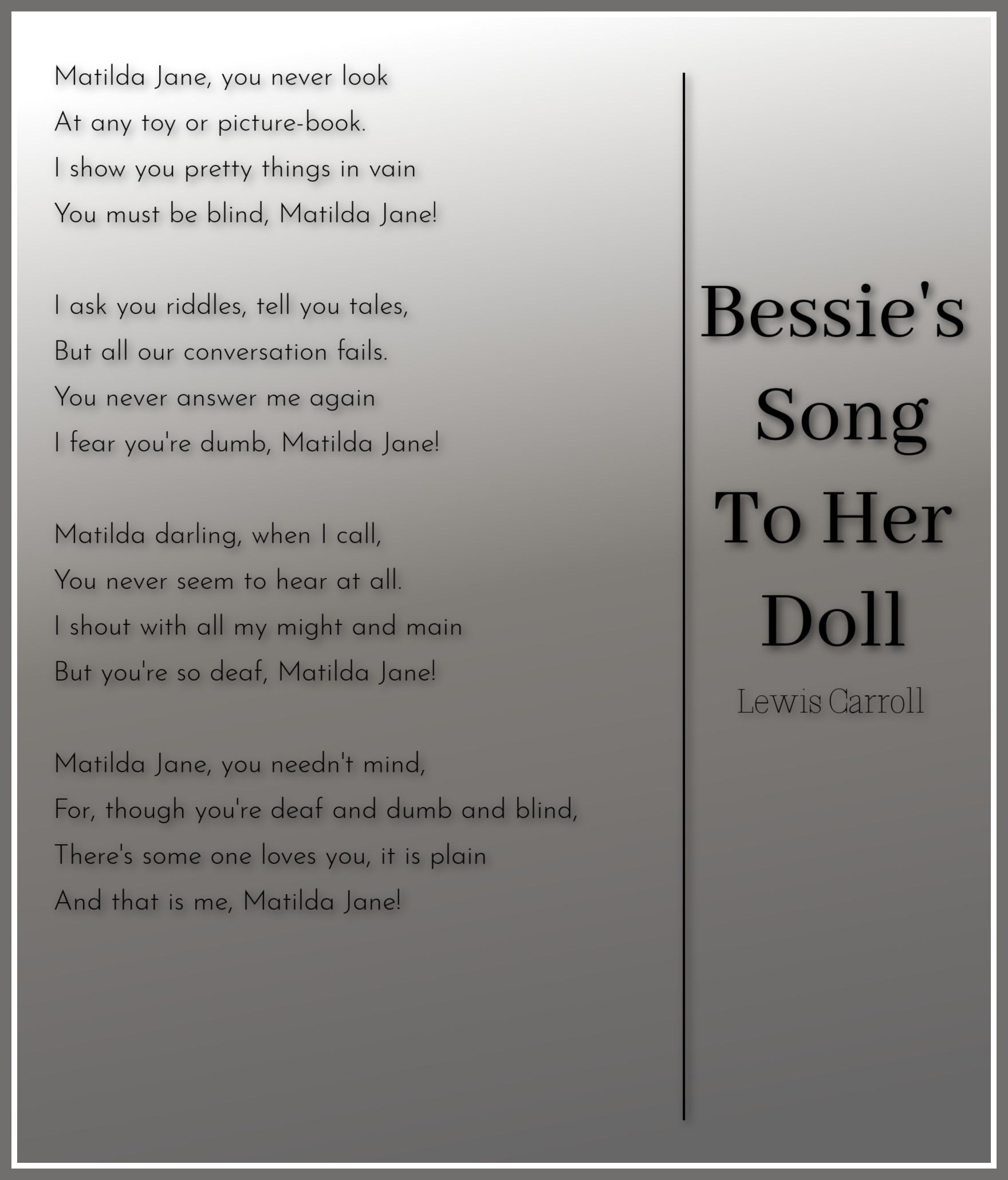
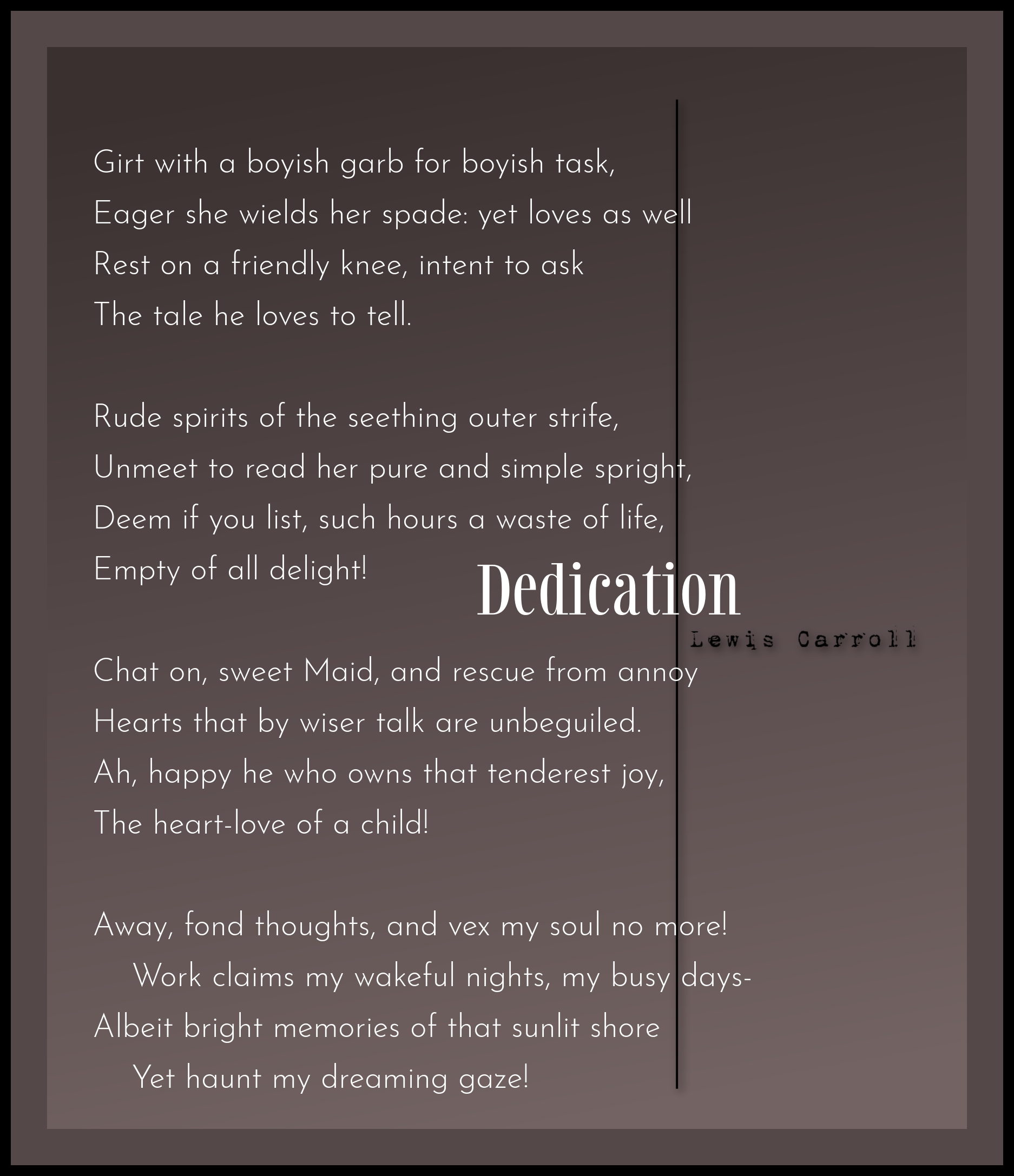
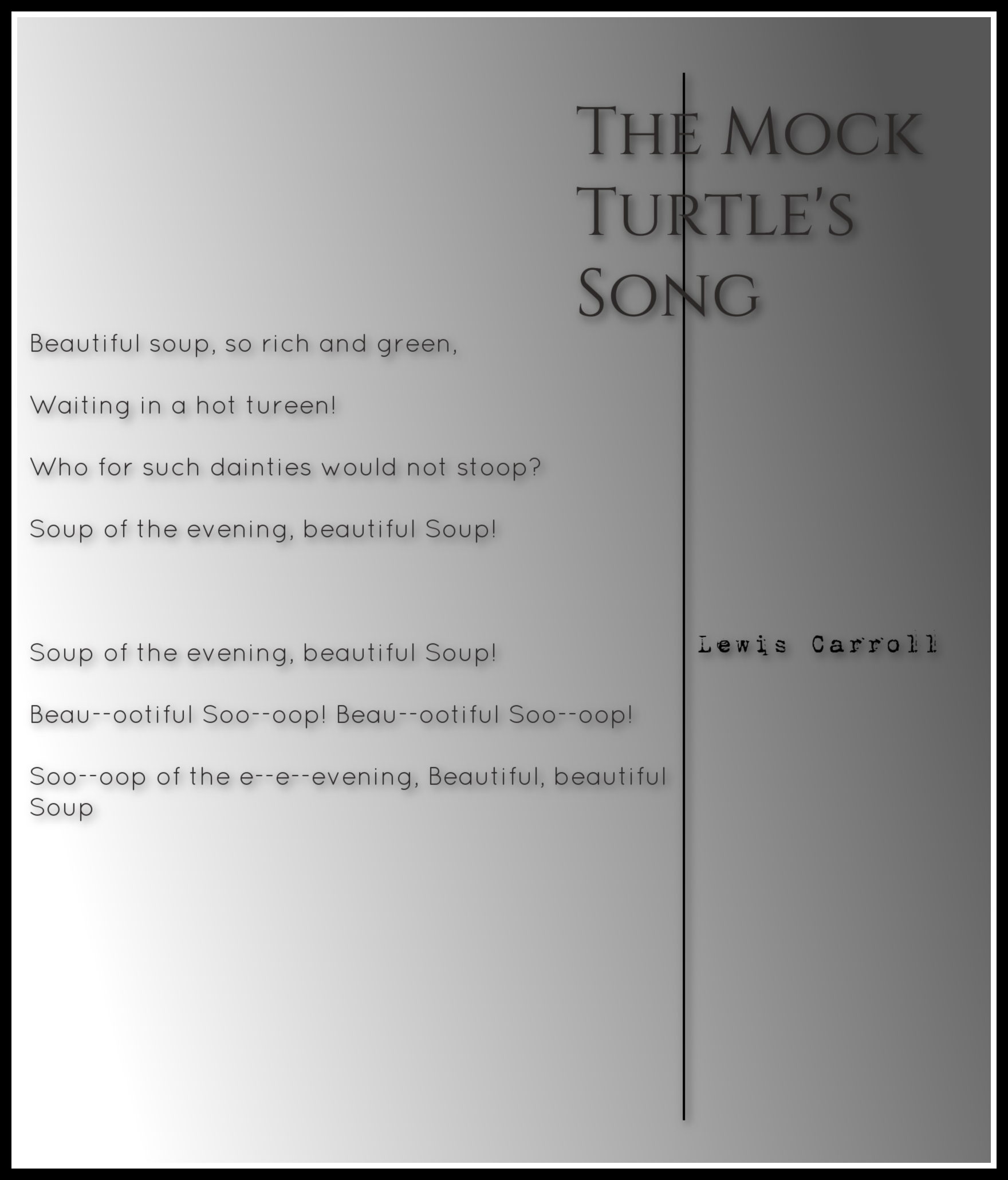
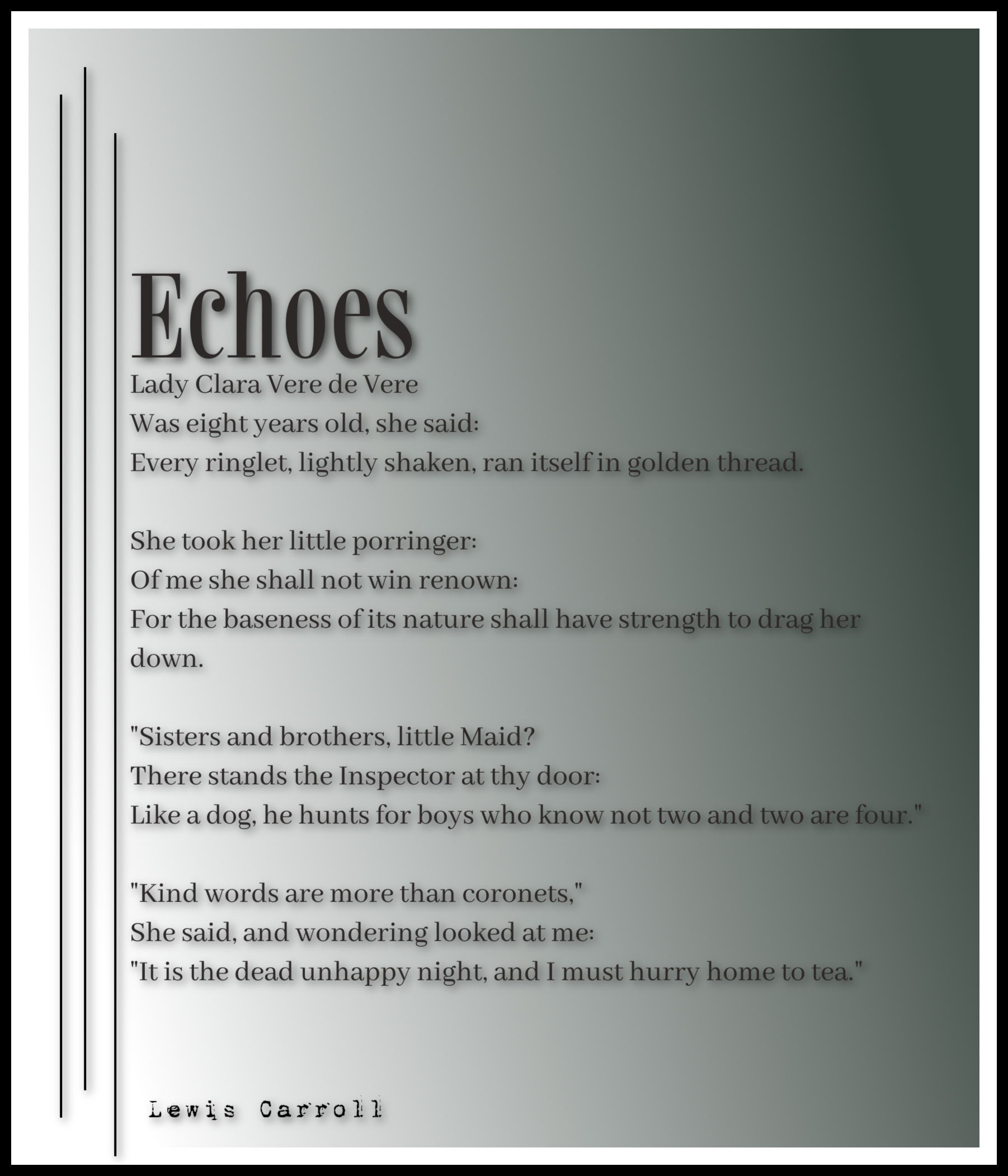
She's All My Fancy Painted Him
She's all my fancy painted him
(I make no idle boast);
If he or you had lost a limb,
Which would have suffered most?
He said that you had been to her,
And seen me here before;
But, in another character,
She was the same of yore.
There was not one that spoke to us,
Of all that thronged the street:
So he sadly got into a 'bus,
And pattered with his feet.
They sent him word I had not gone
(We know it to be true);
If she should push the matter on,
What would become of you?
They gave her one, the gave me two,
They gave us three or more;
They all returned from him to you,
Though they were mine before.
If I or she should chance to be
Involved in this affair,
He trusts to you to set them free,
Exactly as we were.
It seemed to me that you had been
(Before she had this fit)
An obstacle, that came between
Him, and ourselves, and it.
Don't let him know she liked them best,
For this must ever be
A secret, kept from all the rest,
Between yourself and me.
The Walrus And The Carpenter
The sun was shining on the sea,
Shining with all his might:
He did his very best to make
The billows smooth and bright—
And this was odd, because it was
The middle of the night.
The moon was shining sulkily,
Because she thought the sun
Had got no business to be there
After the day was done—
"It's very rude of him," she said,
"To come and spoil the fun!"
The sea was wet as wet could be,
The sands were dry as dry.
You could not see a cloud, because
No cloud was in the sky:
No birds were flying overhead—
There were no birds to fly.
The Walrus and the Carpenter
Were walking close at hand;
They wept like anything to see
Such quantities of sand:
"If this were only cleared away,"
They said, "it would be grand!"
"If seven maids with seven mops
Swept it for half a year.
Do you suppose," the Walrus said,
"That they could get it clear?"
"I doubt it," said the Carpenter,
And shed a bitter tear.
"O Oysters, come and walk with us!"
The Walrus did beseech.
"A pleasant walk, a pleasant talk,
Along the briny beach:
We cannot do with more than four,
To give a hand to each."
The eldest Oyster looked at him,
But never a word he said:
The eldest Oyster winked his eye,
And shook his heavy head—
Meaning to say he did not choose
To leave the oyster-bed.
But four young Oysters hurried up,
All eager for the treat:
Their coats were brushed, their faces washed,
Their shoes were clean and neat—
And this was odd, because, you know,
They hadn't any feet.
Four other Oysters followed them,
And yet another four;
And thick and fast they came at last,
And more, and more, and more—
All hopping through the frothy waves,
And scrambling to the shore.
The Walrus and the Carpenter
Walked on a mile or so,
And then they rested on a rock
Conveniently low:
And all the little Oysters stood
And waited in a row.
"The time has come," the Walrus said,
"To talk of many things:
Of shoes—and ships—and sealing-wax—
Of cabbages—and kings—
And why the sea is boiling hot—
And whether pigs have wings."
"But wait a bit," the Oysters cried,
"Before we have our chat;
For some of us are out of breath,
And all of us are fat!"
"No hurry!" said the Carpenter.
They thanked him much for that.
"A loaf of bread," the Walrus said,
"Is what we chiefly need:
Pepper and vinegar besides
Are very good indeed—
Now if you're ready, Oysters dear,
We can begin to feed."
"But not on us!" the Oysters cried,
Turning a little blue.
"After such kindness, that would be
A dismal thing to do!"
"The night is fine," the Walrus said.
"Do you admire the view?
"It was so kind of you to come!
And you are very nice!"
The Carpenter said nothing but
"Cut us another slice:
I wish you were not quite so deaf—
I've had to ask you twice!"
"It seems a shame," the Walrus said,
"To play them such a trick,
After we've brought them out so far,
And made them trot so quick!"
The Carpenter said nothing but
"The butter's spread too thick!"
"I weep for you," the Walrus said:
"I deeply sympathize."
With sobs and tears he sorted out
Those of the largest size,
Holding his pocket-handkerchief
Before his streaming eyes.
"O Oysters," said the Carpenter,
"You've had a pleasant run!
Shall we be trotting home again?'
But answer came there none—
And this was scarcely odd, because
They'd eaten every one.
The Mad Hatter's Song
" — — it was at the great concert given by the
Queen of Hearts, and I had to sing
`Twinkle, twinkle, little bat!
How I wonder what
you're at!'You know the song, perhaps?" "I've heard something like it,"
said Alice. "It goes on, you know," the Hatter continued,
"in this way: — —
`Up above the world you fly,
Like a teatray in the sky.
Twinkle, twinkle —'"
The Three Voices
The First Voice
HE trilled a carol fresh and free,
He laughed aloud for very glee:
There came a breeze from off the sea:
It passed athwart the glooming flat -
It fanned his forehead as he sat -
It lightly bore away his hat,
All to the feet of one who stood
Like maid enchanted in a wood,
Frowning as darkly as she could.
With huge umbrella, lank and brown,
Unerringly she pinned it down,
Right through the centre of the crown.
Then, with an aspect cold and grim,
Regardless of its battered rim,
She took it up and gave it him.
A while like one in dreams he stood,
Then faltered forth his gratitude
In words just short of being rude:
For it had lost its shape and shine,
And it had cost him four-and-nine,
And he was going out to dine.
"To dine!" she sneered in acid tone.
"To bend thy being to a bone
Clothed in a radiance not its own!"
The tear-drop trickled to his chin:
There was a meaning in her grin
That made him feel on fire within.
"Term it not 'radiance,'" said he:
"'Tis solid nutriment to me.
Dinner is Dinner: Tea is Tea."
And she "Yea so? Yet wherefore cease?
Let thy scant knowledge find increase.
Say 'Men are Men, and Geese are Geese.'"
He moaned: he knew not what to say.
The thought "That I could get away!"
Strove with the thought "But I must stay.
"To dine!" she shrieked in dragon-wrath.
"To swallow wines all foam and froth!
To simper at a table-cloth!
"Say, can thy noble spirit stoop
To join the gormandising troup
Who find a solace in the soup?
"Canst thou desire or pie or puff?
Thy well-bred manners were enough,
Without such gross material stuff."
"Yet well-bred men," he faintly said,
"Are not willing to be fed:
Nor are they well without the bread."
Her visage scorched him ere she spoke:
"There are," she said, "a kind of folk
Who have no horror of a joke.
"Such wretches live: they take their share
Of common earth and common air:
We come across them here and there:
"We grant them - there is no escape -
A sort of semi-human shape
Suggestive of the man-like Ape."
"In all such theories," said he,
"One fixed exception there must be.
That is, the Present Company."
Baffled, she gave a wolfish bark:
He, aiming blindly in the dark,
With random shaft had pierced the mark.
She felt that her defeat was plain,
Yet madly strove with might and main
To get the upper hand again.
Fixing her eyes upon the beach,
As though unconscious of his speech,
She said "Each gives to more than each."
He could not answer yea or nay:
He faltered "Gifts may pass away."
Yet knew not what he meant to say.
"If that be so," she straight replied,
"Each heart with each doth coincide.
What boots it? For the world is wide."
"The world is but a Thought," said he:
"The vast unfathomable sea
Is but a Notion - unto me."
And darkly fell her answer dread
Upon his unresisting head,
Like half a hundredweight of lead.
"The Good and Great must ever shun
That reckless and abandoned one
Who stoops to perpetrate a pun.
"The man that smokes - that reads the TIMES -
That goes to Christmas Pantomimes -
Is capable of ANY crimes!"
He felt it was his turn to speak,
And, with a shamed and crimson cheek,
Moaned "This is harder than Bezique!"
But when she asked him "Wherefore so?"
He felt his very whiskers glow,
And frankly owned "I do not know."
While, like broad waves of golden grain,
Or sunlit hues on cloistered pane,
His colour came and went again.
Pitying his obvious distress,
Yet with a tinge of bitterness,
She said "The More exceeds the Less."
"A truth of such undoubted weight,"
He urged, "and so extreme in date,
It were superfluous to state."
Roused into sudden passion, she
In tone of cold malignity:
"To others, yea: but not to thee."
But when she saw him quail and quake,
And when he urged "For pity's sake!"
Once more in gentle tones she spake.
"Thought in the mind doth still abide
That is by Intellect supplied,
And within that Idea doth hide:
"And he, that yearns the truth to know,
Still further inwardly may go,
And find Idea from Notion flow:
"And thus the chain, that sages sought,
Is to a glorious circle wrought,
For Notion hath its source in Thought."
So passed they on with even pace:
Yet gradually one might trace
A shadow growing on his face.
The Second Voice
THEY walked beside the wave-worn beach;
Her tongue was very apt to teach,
And now and then he did beseech
She would abate her dulcet tone,
Because the talk was all her own,
And he was dull as any drone.
She urged "No cheese is made of chalk":
And ceaseless flowed her dreary talk,
Tuned to the footfall of a walk.
Her voice was very full and rich,
And, when at length she asked him "Which?"
It mounted to its highest pitch.
He a bewildered answer gave,
Drowned in the sullen moaning wave,
Lost in the echoes of the cave.
He answered her he knew not what:
Like shaft from bow at random shot,
He spoke, but she regarded not.
She waited not for his reply,
But with a downward leaden eye
Went on as if he were not by
Sound argument and grave defence,
Strange questions raised on "Why?" and "Whence?"
And wildly tangled evidence.
When he, with racked and whirling brain,
Feebly implored her to explain,
She simply said it all again.
Wrenched with an agony intense,
He spake, neglecting Sound and Sense,
And careless of all consequence:
"Mind - I believe - is Essence - Ent -
Abstract - that is - an Accident -
Which we - that is to say - I meant - "
When, with quick breath and cheeks all flushed,
At length his speech was somewhat hushed,
She looked at him, and he was crushed.
It needed not her calm reply:
She fixed him with a stony eye,
And he could neither fight nor fly.
While she dissected, word by word,
His speech, half guessed at and half heard,
As might a cat a little bird.
Then, having wholly overthrown
His views, and stripped them to the bone,
Proceeded to unfold her own.
"Shall Man be Man? And shall he miss
Of other thoughts no thought but this,
Harmonious dews of sober bliss?
"What boots it? Shall his fevered eye
Through towering nothingness descry
The grisly phantom hurry by?
"And hear dumb shrieks that fill the air;
See mouths that gape, and eyes that stare
And redden in the dusky glare?
"The meadows breathing amber light,
The darkness toppling from the height,
The feathery train of granite Night?
"Shall he, grown gray among his peers,
Through the thick curtain of his tears
Catch glimpses of his earlier years,
"And hear the sounds he knew of yore,
Old shufflings on the sanded floor,
Old knuckles tapping at the door?
"Yet still before him as he flies
One pallid form shall ever rise,
And, bodying forth in glassy eyes
"The vision of a vanished good,
Low peering through the tangled wood,
Shall freeze the current of his blood."
Still from each fact, with skill uncouth
And savage rapture, like a tooth
She wrenched some slow reluctant truth.
Till, like a silent water-mill,
When summer suns have dried the rill,
She reached a full stop, and was still.
Dead calm succeeded to the fuss,
As when the loaded omnibus
Has reached the railway terminus:
When, for the tumult of the street,
Is heard the engine's stifled beat,
The velvet tread of porters' feet.
With glance that ever sought the ground,
She moved her lips without a sound,
And every now and then she frowned.
He gazed upon the sleeping sea,
And joyed in its tranquillity,
And in that silence dead, but she
To muse a little space did seem,
Then, like the echo of a dream,
Harked back upon her threadbare theme.
Still an attentive ear he lent
But could not fathom what she meant:
She was not deep, nor eloquent.
He marked the ripple on the sand:
The even swaying of her hand
Was all that he could understand.
He saw in dreams a drawing-room,
Where thirteen wretches sat in gloom,
Waiting - he thought he knew for whom:
He saw them drooping here and there,
Each feebly huddled on a chair,
In attitudes of blank despair:
Oysters were not more mute than they,
For all their brains were pumped away,
And they had nothing more to say -
Save one, who groaned "Three hours are gone!"
Who shrieked "We'll wait no longer, John!
Tell them to set the dinner on!"
The vision passed: the ghosts were fled:
He saw once more that woman dread:
He heard once more the words she said.
He left her, and he turned aside:
He sat and watched the coming tide
Across the shores so newly dried.
He wondered at the waters clear,
The breeze that whispered in his ear,
The billows heaving far and near,
And why he had so long preferred
To hang upon her every word:
"In truth," he said, "it was absurd."
The Third Voice
NOT long this transport held its place:
Within a little moment's space
Quick tears were raining down his face
His heart stood still, aghast with fear;
A wordless voice, nor far nor near,
He seemed to hear and not to hear.
"Tears kindle not the doubtful spark.
If so, why not? Of this remark
The bearings are profoundly dark."
"Her speech," he said, "hath caused this pain.
Easier I count it to explain
The jargon of the howling main,
"Or, stretched beside some babbling brook,
To con, with inexpressive look,
An unintelligible book."
Low spake the voice within his head,
In words imagined more than said,
Soundless as ghost's intended tread:
"If thou art duller than before,
Why quittedst thou the voice of lore?
Why not endure, expecting more?"
"Rather than that," he groaned aghast,
"I'd writhe in depths of cavern vast,
Some loathly vampire's rich repast."
"'Twere hard," it answered, "themes immense
To coop within the narrow fence
That rings THY scant intelligence."
"Not so," he urged, "nor once alone:
But there was something in her tone
That chilled me to the very bone.
"Her style was anything but clear,
And most unpleasantly severe;
Her epithets were very queer.
"And yet, so grand were her replies,
I could not choose but deem her wise;
I did not dare to criticise;
"Nor did I leave her, till she went
So deep in tangled argument
That all my powers of thought were spent."
A little whisper inly slid,
"Yet truth is truth: you know you did."
A little wink beneath the lid.
And, sickened with excess of dread,
Prone to the dust he bent his head,
And lay like one three-quarters dead
The whisper left him - like a breeze
Lost in the depths of leafy trees -
Left him by no means at his ease.
Once more he weltered in despair,
With hands, through denser-matted hair,
More tightly clenched than then they were.
When, bathed in Dawn of living red,
Majestic frowned the mountain head,
"Tell me my fault," was all he said.
When, at high Noon, the blazing sky
Scorched in his head each haggard eye,
Then keenest rose his weary cry.
And when at Eve the unpitying sun
Smiled grimly on the solemn fun,
"Alack," he sighed, "what HAVE I done?"
But saddest, darkest was the sight,
When the cold grasp of leaden Night
Dashed him to earth, and held him tight.
Tortured, unaided, and alone,
Thunders were silence to his groan,
Bagpipes sweet music to its tone:
"What? Ever thus, in dismal round,
Shall Pain and Mystery profound
Pursue me like a sleepless hound,
"With crimson-dashed and eager jaws,
Me, still in ignorance of the cause,
Unknowing what I broke of laws?"
The whisper to his ear did seem
Like echoed flow of silent stream,
Or shadow of forgotten dream,
The whisper trembling in the wind:
"Her fate with thine was intertwined,"
So spake it in his inner mind:
"Each orbed on each a baleful star:
Each proved the other's blight and bar:
Each unto each were best, most far:
"Yea, each to each was worse than foe:
Thou, a scared dullard, gibbering low,
AND SHE, AN AVALANCHE OF WOE!"
Photography Extraordinary
The Milk-and-Water School
Alas! she would not hear my prayer!
Yet it were rash to tear my hair;
Disfigured, I should be less fair.
She was unwise, I may say blind;
Once she was lovingly inclined;
Some circumstance has changed her mind.
The Strong-Minded or Matter-of-Fact School
Well! so my offer was no go!
She might do worse, I told her so;
She was a fool to answer "No".
However, things are as they stood;
Nor would I have her if I could,
For there are plenty more as good.
The Spasmodic or German School
Firebrands and Daggers! hope hath fled!
To atoms dash the doubly dead!
My brain is fire—my heart is lead!
Her soul is flint, and what am I?
Scorch'd by her fierce, relentless eye,
Nothingness is my destiny!
A Sea Dirge
THERE are certain things - as, a spider, a ghost,
The income-tax, gout, an umbrella for three -
That I hate, but the thing that I hate the most
Is a thing they call the Sea.
Pour some salt water over the floor -
Ugly I'm sure you'll allow it to be:
Suppose it extended a mile or more,
THAT'S very like the Sea.
Beat a dog till it howls outright -
Cruel, but all very well for a spree:
Suppose that he did so day and night,
THAT would be like the Sea.
I had a vision of nursery-maids;
Tens of thousands passed by me -
All leading children with wooden spades,
And this was by the Sea.
Who invented those spades of wood?
Who was it cut them out of the tree?
None, I think, but an idiot could -
Or one that loved the Sea.
It is pleasant and dreamy, no doubt, to float
With 'thoughts as boundless, and souls as free':
But, suppose you are very unwell in the boat,
How do you like the Sea?
There is an insect that people avoid
(Whence is derived the verb 'to flee').
Where have you been by it most annoyed?
In lodgings by the Sea.
If you like your coffee with sand for dregs,
A decided hint of salt in your tea,
And a fishy taste in the very eggs -
By all means choose the Sea.
And if, with these dainties to drink and eat,
You prefer not a vestige of grass or tree,
And a chronic state of wet in your feet,
Then - I recommend the Sea.
For I have friends who dwell by the coast -
Pleasant friends they are to me!
It is when I am with them I wonder most
That anyone likes the Sea.
They take me a walk: though tired and stiff,
To climb the heights I madly agree;
And, after a tumble or so from the cliff,
They kindly suggest the Sea.
I try the rocks, and I think it cool
That they laugh with such an excess of glee,
As I heavily slip into every pool
That skirts the cold cold Sea.
Size And Tears
WHEN on the sandy shore I sit,
Beside the salt sea-wave,
And fall into a weeping fit
Because I dare not shave -
A little whisper at my ear
Enquires the reason of my fear.
I answer "If that ruffian Jones
Should recognise me here,
He'd bellow out my name in tones
Offensive to the ear:
He chaffs me so on being stout
(A thing that always puts me out)."
Ah me! I see him on the cliff!
Farewell, farewell to hope,
If he should look this way, and if
He's got his telescope!
To whatsoever place I flee,
My odious rival follows me!
For every night, and everywhere,
I meet him out at dinner;
And when I've found some charming fair,
And vowed to die or win her,
The wretch (he's thin and I am stout)
Is sure to come and cut me out!
The girls (just like them!) all agree
To praise J. Jones, Esquire:
I ask them what on earth they see
About him to admire?
They cry "He is so sleek and slim,
It's quite a treat to look at him!"
They vanish in tobacco smoke,
Those visionary maids -
I feel a sharp and sudden poke
Between the shoulder-bla des -
"Why, Brown, my boy! Your growing stout!"
(I told you he would find me out!)
"My growth is not YOUR business, Sir!"
"No more it is, my boy!
But if it's YOURS, as I infer,
Why, Brown, I give you joy!
A man, whose business prospers so,
Is just the sort of man to know!
"It's hardly safe, though, talking here -
I'd best get out of reach:
For such a weight as yours, I fear,
Must shortly sink the beach!" -
Insult me thus because I'm stout!
I vow I'll go and call him out!
Phantasmagoria Canto III ( Scarmoges )
"AND did you really walk," said I,
"On such a wretched night?
I always fancied Ghosts could fly -
If not exactly in the sky,
Yet at a fairish height."
"It's very well," said he, "for Kings
To soar above the earth:
But Phantoms often find that wings -
Like many other pleasant things -
Cost more than they are worth.
"Spectres of course are rich, and so
Can buy them from the Elves:
But WE prefer to keep below -
They're stupid company, you know,
For any but themselves:
"For, though they claim to be exempt
From pride, they treat a Phantom
As something quite beneath contempt -
Just as no Turkey ever dreamt
Of noticing a Bantam."
"They seem too proud," said I, "to go
To houses such as mine.
Pray, how did they contrive to know
So quickly that 'the place was low,'
And that I 'kept bad wine'?"
"Inspector Kobold came to you - "
The little Ghost began.
Here I broke in - "Inspector who?
Inspecting Ghosts is something new!
Explain yourself, my man!"
"His name is Kobold," said my guest:
"One of the Spectre order:
You'll very often see him dressed
In a yellow gown, a crimson vest,
And a night-cap with a border.
"He tried the Brocken business first,
But caught a sort of chill ;
So came to England to be nursed,
And here it took the form of THIRST,
Which he complains of still.
"Port-wine, he says, when rich and sound,
Warms his old bones like nectar:
And as the inns, where it is found,
Are his especial hunting-grou nd,
We call him the INN-SPECTRE. "
I bore it - bore it like a man -
This agonizing witticism!
And nothing could be sweeter than
My temper, till the Ghost began
Some most provoking criticism.
"Cooks need not be indulged in waste;
Yet still you'd better teach them
Dishes should have SOME SORT of taste.
Pray, why are all the cruets placed
Where nobody can reach them?
"That man of yours will never earn
His living as a waiter!
Is that queer THING supposed to burn?
(It's far too dismal a concern
To call a Moderator).
"The duck was tender, but the peas
Were very much too old:
And just remember, if you please,
The NEXT time you have toasted cheese,
Don't let them send it cold.
"You'd find the bread improved, I think,
By getting better flour:
And have you anything to drink
That looks a LITTLE less like ink,
And isn't QUITE so sour?"
Then, peering round with curious eyes,
He muttered "Goodness gracious!"
And so went on to criticise -
"Your room's an inconvenient size:
It's neither snug nor spacious.
"That narrow window, I expect,
Serves but to let the dusk in - "
"But please," said I, "to recollect
'Twas fashioned by an architect
Who pinned his faith on Ruskin!"
"I don't care who he was, Sir, or
On whom he pinned his faith!
Constructed by whatever law,
So poor a job I never saw,
As I'm a living Wraith!
"What a re-markable cigar!
How much are they a dozen?"
I growled "No matter what they are!
You're getting as familiar
As if you were my cousin!
"Now that's a thing I WILL NOT STAND,
And so I tell you flat."
"Aha," said he, "we're getting grand!"
(Taking a bottle in his hand)
"I'll soon arrange for THAT!"
And here he took a careful aim,
And gaily cried "Here goes!"
I tried to dodge it as it came,
But somehow caught it, all the same,
Exactly on my nose.
And I remember nothing more
That I can clearly fix,
Till I was sitting on the floor,
Repeating "Two and five are four,
But FIVE AND TWO are six."
What really passed I never learned,
Nor guessed: I only know
That, when at last my sense returned,
The lamp, neglected, dimly burned -
The fire was getting low -
Through driving mists I seemed to see
A Thing that smirked and smiled:
And found that he was giving me
A lesson in Biography,
As if I were a child.
Lays Of Sorrow
The day was wet, the rain fell souse
Like jars of strawberry jam, [1] a
sound was heard in the old henhouse,
A beating of a hammer.
Of stalwart form, and visage warm,
Two youths were seen within it,
Splitting up an old tree into perches for their poultry
At a hundred strokes [2] a minute.
The work is done, the hen has taken
Possession of her nest and eggs,
Without a thought of eggs and bacon, [3]
(Or I am very much mistaken happy)
She turns over each shell,
To be sure that all's well,
Looks into the straw
To see there's no flaw,
Goes once round the house, [4]
Half afraid of a mouse,
Then sinks calmly to rest
On the top of her nest,
First doubling up each of her legs.
Time rolled away, and so did every shell,
"Small by degrees and beautifully less,"
As the large mother with a powerful spell [5]
Forced each in turn its contents to express, [6]
But ah! "imperfect is expression,"
Some poet said, I don't care who,
If you want to know you must go elsewhere,
One fact I can tell, if you're willing to hear,
He never attended a Parliament Session,
For I'm certain that if he had ever been there,
Full quickly would he have changed his ideas,
With the hissings, the hootings, the groans and the cheers.
And as to his name it is pretty clear
That it wasn't me and it wasn't you!
And so it fell upon a day,
(That is, it never rose again)
A chick was found upon the hay,
Its little life had ebbed away.
No longer frolicsome and gay,
No longer could it run or play.
"And must we, chicken, must we part?"
Its master [7] cried with bursting heart,
And voice of agony and pain.
So one, whose ticket's marked "Return", [8]
When to the lonely roadside station
He flies in fear and perturbation ,
Thinks of his home—the hissing urn—
Then runs with flying hat and hair,
And, entering, finds to his despair
He's missed the very last train. [9]
Too long it were to tell of each conjecture
Of chicken suicide, and poultry victim,
The deadly frown, the stern and dreary lecture,
The timid guess, "perhaps some needle pricked him!"
The din of voice, the words both loud and many,
The sob, the tear, the sigh that none could smother,
Till all agreed "a shilling to a penny
It killed itself, and we acquit the mother!"
Scarce was the verdict spoken,
When that still calm was broken,
A childish form hath burst into the throng;
With tears and looks of sadness,
That bring no news of gladness,
But tell too surely something hath gone wrong!
"The sight I have come upon
The stoutest heart [10] would sicken,
That nasty hen has been and gone
And killed another chicken!"
Melancholetta
WITH saddest music all day long
She soothed her secret sorrow:
At night she sighed "I fear 'twas wrong
Such cheerful words to borrow.
Dearest, a sweeter, sadder song
I'll sing to thee to-morrow."
I thanked her, but I could not say
That I was glad to hear it:
I left the house at break of day,
And did not venture near it
Till time, I hoped, had worn away
Her grief, for nought could cheer it!
My dismal sister! Couldst thou know
The wretched home thou keepest!
Thy brother, drowned in daily woe,
Is thankful when thou sleepest;
For if I laugh, however low,
When thou'rt awake, thou weepest!
I took my sister t'other day
(Excuse the slang expression)
To Sadler's Wells to see the play
In hopes the new impression
Might in her thoughts, from grave to gay
Effect some slight digression.
I asked three gay young dogs from town
To join us in our folly,
Whose mirth, I thought, might serve to drown
My sister's melancholy:
The lively Jones, the sportive Brown,
And Robinson the jolly.
The maid announced the meal in tones
That I myself had taught her,
Meant to allay my sister's moans
Like oil on troubled water:
I rushed to Jones, the lively Jones,
And begged him to escort her.
Vainly he strove, with ready wit,
To joke about the weather -
To ventilate the last 'ON DIT' -
To quote the price of leather -
She groaned "Here I and Sorrow sit:
Let us lament together!"
I urged "You're wasting time, you know:
Delay will spoil the venison."
"My heart is wasted with my woe!
There is no rest - in Venice, on
The Bridge of Sighs!" she quoted low
From Byron and from Tennyson.
I need not tell of soup and fish
In solemn silence swallowed,
The sobs that ushered in each dish,
And its departure followed,
Nor yet my suicidal wish
To BE the cheese I hollowed.
Some desperate attempts were made
To start a conversation;
"Madam," the sportive Brown essayed,
"Which kind of recreation,
Hunting or fishing, have you made
Your special occupation?"
Her lips curved downwards instantly,
As if of india-rubber.
"Hounds IN FULL CRY I like," said she:
(Oh how I longed to snub her!)
"Of fish, a whale's the one for me,
IT IS SO FULL OF BLUBBER!"
The night's performance was "King John."
"It's dull," she wept, "and so-so!"
Awhile I let her tears flow on,
She said they soothed her woe so!
At length the curtain rose upon
'Bombastes Furioso.'
In vain we roared; in vain we tried
To rouse her into laughter:
Her pensive glances wandered wide
From orchestra to rafter -
"TIER UPON TIER!" she said, and sighed;
And silence followed after.
Fit The Sixth - The Barrister's Dream
They sought it with thimbles, they sought it with care;
They pursued it with forks and hope;
They threatened its life with a railway-share;
They charmed it with smiles and soap.
But the Barrister, weary of proving in vain
That the Beaver's lace-making was wrong,
Fell asleep, and in dreams saw the creature quite plain
That his fancy had dwelt on so long.
He dreamed that he stood in a shadowy Court,
Where the Snark, with a glass in its eye,
Dressed in gown, bands, and wig, was defending a pig
On the charge of deserting its sty.
The Witnesses proved, without error or flaw,
That the sty was deserted when found:
And the Judge kept explaining the state of the law
In a soft under-current of sound.
The indictment had never been clearly expressed,
And it seemed that the Snark had begun,
And had spoken three hours, before any one guessed
What the pig was supposed to have done.
The Jury had each formed a different view
(Long before the indictment was read),
And they all spoke at once, so that none of them knew
One word that the others had said.
"You must know—" said the Judge: but the Snark exclaimed "Fudge!"
That statute is obsolete quite!
Let me tell you, my friends, the whole question depends
On an ancient manorial right.
"In the matter of Treason the pig would appear
To have aided, but scarcely abetted:
While the charge of Insolvency fails, it is clear,
If you grant the plea 'never indebted'.
"The fact of Desertion I will not dispute:
But its guilt, as I trust, is removed
(So far as relates to the costs of this suit)
By the Alibi which has been proved.
"My poor client's fate now depends on your votes."
Here the speaker sat down in his place,
And directed the Judge to refer to his notes
And briefly to sum up the case.
But the Judge said he never had summed up before;
So the Snark undertook it instead,
And summed it so well that it came to far more
Than the Witnesses ever had said!
When the verdict was called for, the Jury declined,
As the word was so puzzling to spell;
But they ventured to hope that the Snark wouldn't mind
Undertaking that duty as well.
So the Snark found the verdict, although, as it owned,
It was spent with the toils of the day:
When it said the word "GUILTY!" the Jury all groaned
And some of them fainted away.
Then the Snark pronounced sentence, the Judge being quite
Too nervous to utter a word:
When it rose to its feet, there was silence like night,
And the fall of a pin might be heard.
"Transportation for life" was the sentence it gave,
"And then to be fined forty pound."
The Jury all cheered, though the Judge said he feared
That the phrase was not legally sound.
But their wild exultation was suddenly checked
When the jailer informed them, with tears,
Such a sentence would not have the slightest effect,
As the pig had been dead for some years.
The Judge left the Court, looking deeply disgusted
But the Snark, though a little aghast,
As the lawyer to whom the defence was intrusted,
Went bellowing on to the last.
Thus the Barrister dreamed, while the bellowing seemed
To grow every moment more clear:
Till he woke to the knell of a furious bell,
Which the Bellman rang close at his ear.
Theme With Variations
I never loved a dear Gazelle—
Nor anything that cost me much:
High prices profit those who sell,
But why should I be fond of such?
To glad me with his soft black eye
My son comes trotting home from school;
He's had a fight but can't tell why—
He always was a little fool!
But, when he came to know me well,
He kicked me out, her testy Sire:
And when I stained my hair, that Belle
Might note the change and this admire
And love me, it was sure to dye
A muddy green, or staring blue:
Whilst one might trace, with half an eye,
The still triumphant carrot through
The Landing
"Just the place for a Snark!" the Bellman cried,
As he landed his crew with care;
Supporting each man on the top of the tide
By a finger entwined in his hair.
"Just the place for a Snark! I have said it twice:
That alone should encourage the crew.
Just the place for a Snark! I have said it thrice:
What I tell you three times is true."
The crew was complete: it included a Boots—
A maker of Bonnets and Hoods—
A Barrister, brought to arrange their disputes—
And a Broker, to value their goods.
A Billiard-marker, whose skill was immense,
Might perhaps have won more than his share—
But a Banker, engaged at enormous expense,
Had the whole of their cash in his care.
There was also a Beaver, that paced on the deck,
Or would sit making lace in the bow:
And had often (the Bellman said) saved them from wreck
Though none of the sailors knew how.
There was one who was famed for the number of things
He forgot when he entered the ship:
His umbrella, his watch, all his jewels and rings,
And the clothes he had bought for the trip.
He had forty-two boxes, all carefully packed,
With his name painted clearly on each:
But, since he omitted to mention the fact,
They were all left behind on the beach.
The loss of his clothes hardly mattered, because
He had seven coats on when he came,
With three pair of boots—but the worst of is was,
He had wholly forgotten his name.
He would answer to "Hi!" or to any loud cry,
Such as "Fry me!" or "Fritter my wig!"
To "What-you-may-call-um!" or "What-was-his-name!"
But especially "Thing-um-a-jig!"
While, for those who preferred a more forcible word,
He had different names from these:
His intimate friends called him "Candle-ends",
And his enemies "Toasted-cheese"
"His form is ungainly—his intellect small—"
(So the Bellman would often remark)—
"But his courage is perfect! And that, after all,
Is the thing that one needs with a Snark."
He would joke with hyaenas, returning their stare
With an impudent wag of the head:
And he once went a walk, paw-in-paw, with a bear,
"Just to keep up its spirits," he said.
He came as a Baker: but owned, when too late—
And it drove the poor Bellman half-mad—
He could only bake Bridecake—for which, I may state,
No materials were to be had.
The last of the crew needs especial remark,
Though he looked an incredible dunce:
He had just one idea—but, that one being "Snark",
The good Bellman engaged him at once.
He came as a Butcher: but gravely declared,
When the ship had been sailing a week,
He could only kill Beavers. The Bellman looked scared,
And was almost too frightened to speak:
But at length he explained, in a tremulous tone,
There was only one Beaver on board;
And that was a tame one he had of his own,
Whose death would be deeply deplored.
The Beaver, who happened to hear the remark,
Protested, with tears in its eyes,
That not even the rapture of hunting the Snark
Could atone for that dismal surprise!
It strongly advised that the Butcher should be
Conveyed in a separate ship:
But the Bellman declared that would never agree
With the plans he had made for the trip:
Navigation was always a difficult art,
Though with only one ship and one bell:
And he feared he must really decline, for his part,
Undertaking another as well.
The Beaver's best course was, no doubt, to procure
A second-hand dagger-proof coat—
So the baker advised it—and next, to insure
Its life in some Office of note:
This the Banker suggested, and offered for hire
(On moderate terms), or for sale,
Two excellent Policies, one Against Fire
And one Against Damage From Hail.
Yet still, ever after that sorrowful day,
Whenever the Butcher was by,
The Beaver kept looking the opposite way,
And appeared unaccountably shy.
Atalanta In Camden -Town
AY, 'twas here, on this spot,
In that summer of yore,
Atalanta did not
Vote my presence a bore,
Nor reply to my tenderest talk "She had
heard all that nonsense before."
She'd the brooch I had bought
And the necklace and sash on,
And her heart, as I thought,
Was alive to my passion;
And she'd done up her hair in the style that
the Empress had brought into fashion.
I had been to the play
With my pearl of a Peri -
But, for all I could say,
She declared she was weary,
That "the place was so crowded and hot, and
she couldn't abide that Dundreary."
Then I thought "Lucky boy!
'Tis for YOU that she whimpers!"
And I noted with joy
Those sensational simpers:
And I said "This is scrumptious!" - a
phrase I had learned from the Devonshire shrimpers.
And I vowed "'Twill be said
I'm a fortunate fellow,
When the breakfast is spread,
When the topers are mellow,
When the foam of the bride-cake is white,
and the fierce orange-blossoms are yellow!"
O that languishing yawn!
O those eloquent eyes!
I was drunk with the dawn
Of a splendid surmise -
I was stung by a look, I was slain by a tear,
by a tempest of sighs.
Then I whispered "I see
The sweet secret thou keepest.
And the yearning for ME
That thou wistfully weepest!
And the question is 'License or Banns?',
though undoubtedly Banns are the cheapest."
"Be my Hero," said I,
"And let ME be Leander!"
But I lost her reply -
Something ending with "gander" -
For the omnibus rattled so loud that no
mortal could quite understand her.
The Lobster-Quadrille
"Will you walk a little faster?" said a whiting to a snail,
"There's a porpoise close behind us, and he's treading on my tail.
See how eagerly the lobsters and the turtles all advance!
They are waiting on the shingle — will you come and join the dance?
Will you, won't you, will you, won't you, will you join the dance?
Will you, won't you, will you, won't you, won't you join the dance?
"You can really have no notion how delightful it will be
When they take us up and throw us, with the lobsters, out to sea!"
But the snail replied "Too far, too far!" and gave a look askance —
Said he thanked the whiting kindly, but he would not join the dance.
Would not, could not, would not, could not, would not join the dance.
Would not, could not, would not, could not, could not join the dance.
"What matters it how far we go?" his scaly friend replied.
"There is another shore, you know, upon the other side.
The further off from England the nearer is to France —
Then turn not pale, beloved snail, but come and join the dance.
Will you, won't you, will you, won't you, will you join the dance?
Will you, won't you, will you, won't you, won't you join the dance?
The Voice Of The Lobster
"'Tis the voice of the Lobster: I heard him declare
'You have baked me too brown, I must sugar my hair.'
As a duck with its eyelids, so he with his nose
Trims his belt and his buttons, and turns out his toes.
When the sands are all dry, he is gay as a lark,
And will talk in contemptuous tones of the Shark:
But, when the tide rises and sharks are around,
His voice has a timid and tremulous sound."
"I passed by his garden, and marked, with one eye,
How the Owl and the Panter were sharing a pie:
The Panther took pie-crust, and gravy, and meat,
While the Old had the dish as its share of the treat.
When the pie was all finished, the Owl, as a boon,
Was kindly permitted to pocket the spoon:
While the Panther received knife and fork with a growl,
And concluded the banquet by [eating the owl.]
The Knight's Song
I'll tell thee everything I can:
There's little to relate.
I saw an aged aged man,
A-sitting on a gate.
'Who are you, aged man?' I said.
'And how is it you live?'
And his answer trickled through my head,
Like water through a sieve.
He said, 'I look for butterflies
That sleep among the wheat:
I make them into mutton-pies,
And sell them in the street.
I sell them unto men,' he said,
'Who sail on stormy seas;
And that's the way I get my bread —
A trifle, if you please.'
But I was thinking of a plan
To dye one's whiskers green,
And always use so large a fan
That they could not be seen.
So having no reply to give
To what the old man said, I cried
'Come, tell me how you live!'
And thumped him on the head.
His accents mild took up the tale:
He said 'I go my ways,
And when I find a mountain-rill,
I set it in a blaze;
And thence they make a stuff they call
Rowland's Macassar-Oil —
Yet twopence-halfpenny is all
They give me for my toil.'
But I was thinking of a way
To feed oneself on batter,
And so go on from day to day '
Getting a little fatter.
I shook him well from side to side,
Until his face was blue:
'Come, tell me how you live,' I cried,
'And what it is you do!'
He said, 'I hunt for haddocks' eyes
Among the heather bright,
And work them into waistcoat-buttons
In the silent night.
And these I do not sell for gold
Or coin of silvery shine,
But for a copper halfpenny,
And that will purchase nine.
'I sometimes dig for buttered rolls,
Or set limed twigs for crabs:
I sometimes search the grassy knolls
For wheels of Hansom-cabs.
And that's the way' (he gave a wink)
'By which I get my wealth —
And very gladly will I drink
Your Honour's noble health.'
I heard him then, for I had just
Completed my design
To keep the Menai bridge from rust
By boiling it in wine.
I thanked him much for telling me
The way he got his wealth,
But chiefly for his wish that he
Might drink my noble health.
And now, if e'er by chance I put
My fingers into glue,
Or madly squeeze a right-hand foot
Into a left-hand shoe,
Or if I drop upon my toe
A very heavy weight,
I weep, for it reminds me so
Of that old man I used to know —
Whose look was mild, whose speech was slow
Whose hair was whiter than the snow,
Whose face was very like a crow,
With eyes, like cinders, all aglow,
Who seemed distracted with his woe,
Who rocked his body to and fro,
And muttered mumblingly and low,
As if his mouth were full of dough,
Who snorted like a buffalo-
That summer evening long ago,
A-sitting on a gate.
|
|
